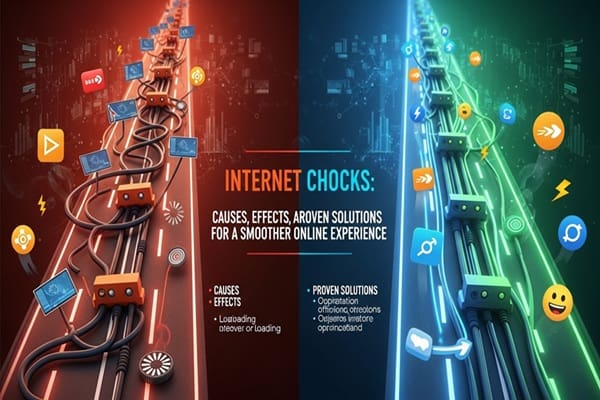Internet Chockes: Causes, Effects, and Proven Solutions for a Smoother Online Experience

Internet Choking? Here’s What’s Really Slowing You Down—and How to Fix It Fast
Ever been in the middle of a Zoom call or intense online match, and your screen just freezes? Or maybe your movie starts buffering at the worst moment? You’re not alone—and you’ve likely run into something called an internet chokes (or chock, depending on who you ask). In simple terms, it’s that sudden and frustrating drop in your internet speed or connection quality.
Let’s break it all down—what causes these digital hiccups, what they mess with, and most importantly, how you can get back to smooth, reliable internet with just a few smart tweaks.
What Are Internet Chokes, Anyway?
Think of an internet choke like a traffic jam on your data highway. When things get too crowded or your “vehicle” (router, hardware, or signal) isn’t built for the rush, everything slows to a crawl—or just stops.
You might notice:
-
Sluggish browsing
-
Buffering during videos
-
Online game lag
-
Dropped calls on Zoom, Skype, or Teams
Now let’s dive into why these issues happen—and how to fix them.
Top Causes of Internet Chokes (And What They Mean for You)
1. Network Congestion
Just like rush hour traffic, your internet slows when too many devices try to access it at once—especially during peak hours (like evenings).
What you can do:
Upgrade your internet plan if you’ve got a house full of streamers and gamers, or limit activity during high-traffic times.
2. Weak Wi-Fi Signal
Walls, furniture, and even microwaves can mess with your Wi-Fi. If your signal isn’t reaching you properly, you’ll feel the lag.
What you can do:
Place your router in a central, open location. Consider Wi-Fi extenders if your space is large or multi-story.
3. Outdated Router or Modem
Old hardware might not keep up with newer internet speeds or the demands of multiple users and smart devices.
What you can do:
Invest in a modern router—ideally one that supports Wi-Fi 6, mesh systems, and offers dual- or tri-band connectivity.
4. ISP Throttling
Some Internet Service Providers (ISPs) intentionally slow down certain types of traffic, like streaming or gaming, especially after you’ve used a lot of data.
What you can do:
Try using a VPN to mask your traffic, or call your ISP and ask about higher-tier plans or data limits.
5. Interference from Other Devices
Cordless phones, baby monitors, even your neighbor’s Wi-Fi network can interfere with yours if they use the same frequency.
What you can do:
Switch your router to a different channel or upgrade to a router with smart band steering.
6. Software or Firmware Issues
Outdated router firmware or buggy apps can cause slowdowns or unstable connections.
What you can do:
Regularly update your router firmware and operating systems on all connected devices. For those interested in learning more about networking, cybersecurity, and IT skills that help prevent issues like these, platform like Cybrary offer comprehensive courses and tutorials.
7. Bad Weather or Environmental Disruptions
Storms, heavy rain, or even construction work can affect infrastructure, especially with cable or satellite internet.
What you can do:
If you suspect external issues, contact your ISP. Backup options like mobile data or a portable hotspot can help short-term.
Also Read : Innovation News DualMedia: The Future of Digital Tech Journalism
How Internet Chokes Affect Your Daily Life
You might be surprised how much of your day relies on solid internet. Here’s how chokes can mess with different activities:
-
Streaming: Endless buffering, blurry videos, and audio that doesn’t sync.
-
Gaming: Lag spikes, lost matches, and rage-quits from unstable ping.
-
Remote Work: Dropped Zoom calls, frozen screens, and late file uploads.
-
Online Shopping or Banking: Failed transactions and page timeouts.
-
Video & Voice Calls: Choppy audio, dropped connections, or awkward delays.
10 Smart Fixes to Prevent (and Solve) Internet Chokes
Ready to speed things up? Here are the most effective ways to get your internet running smooth again:
1. Upgrade Your Internet Plan
If your current plan can’t handle your household’s usage—especially with multiple devices—it might be time to upgrade to more bandwidth.
2. Move Your Router
Location matters. Keep it central and off the floor. Avoid putting it near microwaves or thick concrete walls.
3. Use a Wired Connection
Whenever possible, plug into your router with an Ethernet cable for the most stable and fastest connection—especially for work, streaming, or gaming.
4. Update Your Router Firmware
Most people forget this step! Manufacturers release updates to fix bugs, improve security, and boost performance.
5. Limit Background Apps
Close unused apps and browser tabs. Turn off auto-updates while you’re gaming, streaming, or on an important call.
6. Replace Old Equipment
If your router or modem is more than 4–5 years old, it’s probably time for an upgrade.
Pro tip:
Look for routers with QoS (Quality of Service) features—they let you prioritize traffic (e.g., give Zoom calls higher priority over Netflix downloads).
7. Install a Mesh Wi-Fi System
Mesh systems use multiple nodes to spread signal evenly across large homes or tricky layouts, eliminating dead zones.
8. Try a VPN (With Caution)
If you suspect ISP throttling, a VPN can help—but it may slow your connection if not configured properly. Use a reputable VPN and test your speeds before sticking with it.
9. Change Your Wi-Fi Channel
Routers automatically pick a channel, but sometimes they get it wrong. Use your router’s app or settings to switch to a less crowded one.
10. Talk to Your ISP
Still stuck with slow speeds? Contact your provider to:
-
Report outages
-
Ask about better plans
-
Get a technician to check line quality
FAQs: Quick Answers to Common Internet Choke Questions
What exactly are internet chokes?
They’re sudden slowdowns or cutoffs in your internet connection, usually caused by congestion, poor signal, hardware issues, or ISP throttling.
How can I tell if I’m dealing with a choke?
Frequent buffering, online lag, or bad call quality (even with a good plan) are tell-tale signs. Speed tests can help pinpoint the issue.
Will a VPN fix internet chokes?
Sometimes. If your ISP is throttling your speed, a VPN might help. But it can also slightly slow things down because of the encryption.
What kind of router should I buy to avoid chokes?
Look for a dual-band or tri-band router with Wi-Fi 6 support, good range, and QoS settings for traffic prioritization.
Do internet chokes happen on mobile data too?
Yes! Network congestion and poor signal in certain areas can choke mobile connections too—especially during peak usage hours.
Final Thoughts
Internet chokes are a modern-day pain—no doubt. But the good news? Most of them are fixable with the right tools, a little know-how, and maybe a call to your ISP. Whether you’re working from home, catching up on your favorite shows, or battling it out in an online game, a smooth connection makes all the difference.
Take action today, and say goodbye to frozen screens and lag spikes for good.



